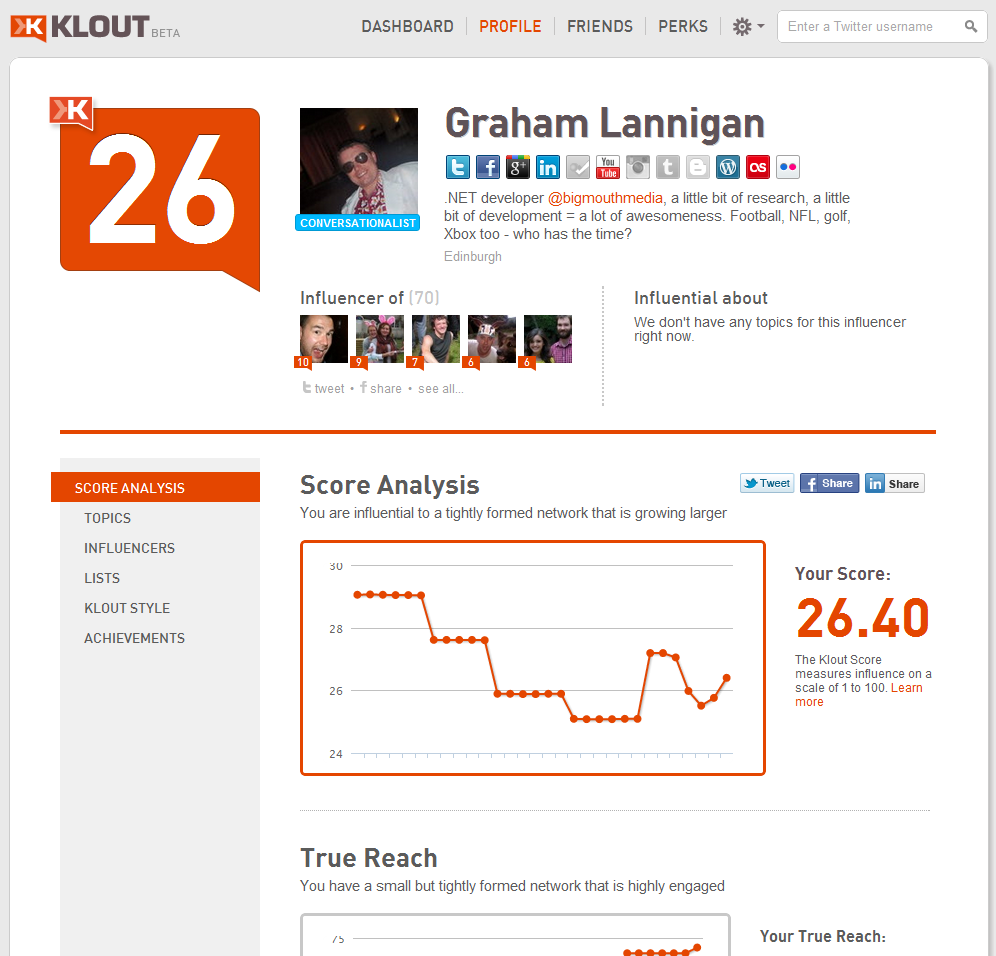Klout online influence scores gaining extra sway
If you’re a reasonably social media-savvy person, you’ll no doubt have heard of (and perhaps used) Klout, an innovative online service for measuring online influence via social media. Klout’s unique selling point is their own calculation of influence, the Klout Score. While it’s not exactly new to the social sphere, having been on the go in some shape or form since 2008, Klout have recently been engaging in a substantial push to increase the scope of their offering by adding many more social networks and features.
As far as I’m concerned, there are 3 defining aspects of the Klout service, each providing some useful information and/or insight into a person’s social media identity.
First up, the most publicised and widely known feature of Klout, the Klout score. The Klout score is intended to represent an individual’s influence in the social internet as a single metric. This score can vary over time as someone gains more influence by sharing, interacting and commenting or loses influence by staying away from social media or posting content that dies on its arse. Links Naji provides a nice breakdown of the Klout score in his blog post about the Klout API, so I won’t cover the same details here. The good news is that the algorithm used to calculate the Klout score seems to be growing in complexity by the day and the clever folks over at Klout kastle are constantly working away on integrating new services.
Over the last few months, they’ve added Google+ to the existing Facebook/Twitter integration, completing the triumvirate of primary social identity networks. In addition to the big 3, they’ve added support for an impressive list of supporting networks such as: LinkedIn, Blogger, WordPress.com and Foursquare, as well as a number of supporting media based networks, such as YouTube, Flickr and Last.fm. While it’s not known exactly how they calculate the Klout score from all these networks, the more data available, the better they can calculate true influence across the social sphere. To top it all off, Klout are now working on adding integration for Quora and bit.ly.

Example of my Klout profile
Following on from the additional services is the way that Klout links all your connected services together on your profile. While it’s nothing new or particularly exciting to joe public, for someone working in digital marketing, it’s a great way to find out where else an individual (or brand) is active and identify opportunities to improve their social offering. In addition to associated identities, Klout also tells you who your big influences are and who you influence the most. this may be people who retweet, comment or like any content you’ve shared across all networks. In a nod to the Xbox 360, they’ve even added their own achievement system! doesn’t seem to be any way to boost your gamerscore though!
Lastly, the addition of some analytics features enables users to track their score over time, as well as other key metrics used by Klout such as True Reach, Amplification and Network Impact. If you’re really focussed on improving your Klout score, these tracking tools give you the ability to evaluate how any activity you perform impacts your social circles. Nothing to rival Google Analytics at the moment, but a very nice addition nonetheless.
I last looked at Klout a couple of months ago and in the short time since then, they’ve completely revamped their whole profile system and added loads of new services. These folks certainly aren’t waiting around I really can’t wait to see what they add to their site and API over the next few months. At this rate, I wouldn’t be surprised if we start hearing stories of Google, Microsoft, Twitter or Facebook sniffing around trying to get in on the act.
Watch this space.